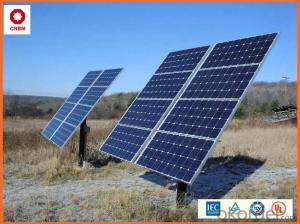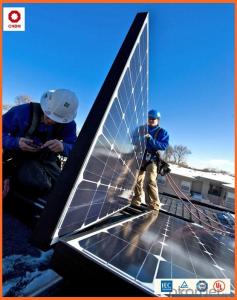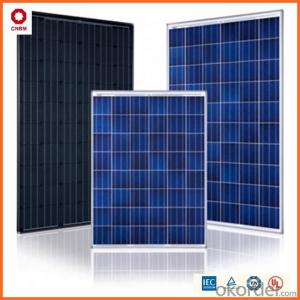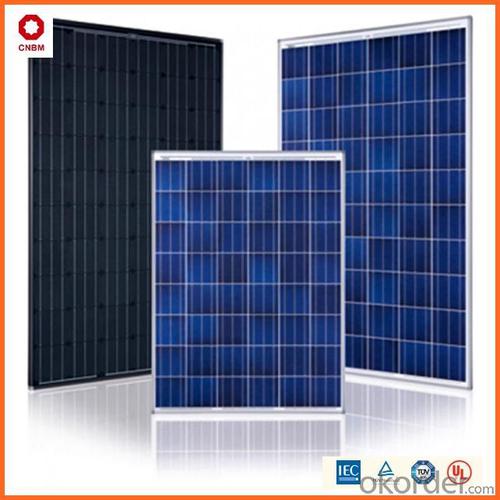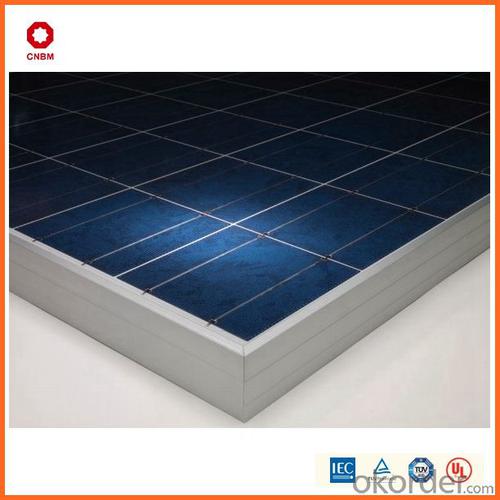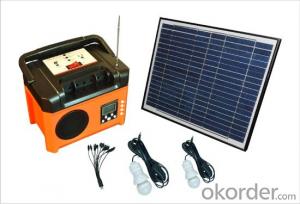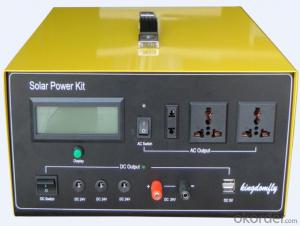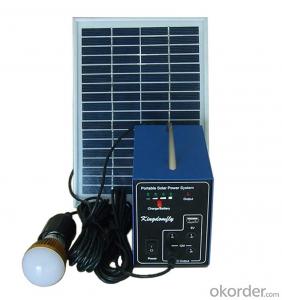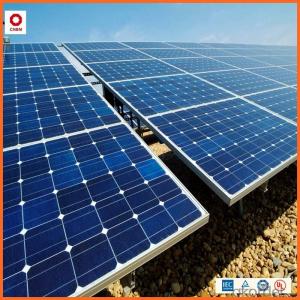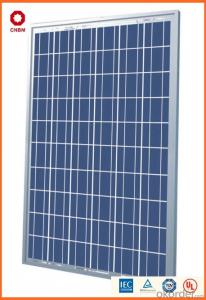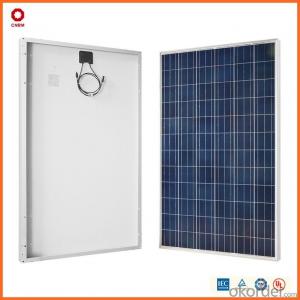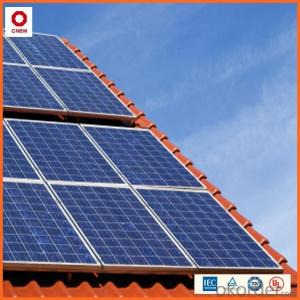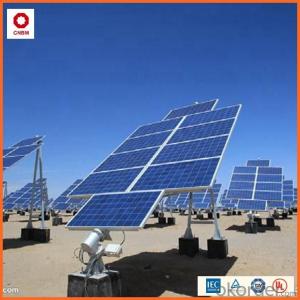Solar Energy Systems Minnesota - !!! Hot on Sale!!! Stock 320W Poly Solar Panel USD0.46/W A Grade Good Solar Panel On Sale
- Loading Port:
- China main port
- Payment Terms:
- TT OR LC
- Min Order Qty:
- 1 watt
- Supply Capability:
- 10000000 watt/month
OKorder Service Pledge
OKorder Financial Service
You Might Also Like
Product Description:
Hot Sale !!! Quality and Safety of 245w-320w Poly Solar Panel
1. Rigorous quality control meets the highest international standards.
2. High-transmissivity low-iron tempered glass, strong aluminium frame.
3. Using UV-resistant silicon.
4. IS09001/14001/CE/TUV/UL
Warranties of 245w-320w Poly Solar Panel
1. 10 years limited product warranty
2. 15 years at 90% of the minimal rated power output
3. 25 years at 80% of the minimal rated power output
Technical date of 245w-320w Poly Solar Panel
ITEM NO.: | Mono 125*125 cell ,36pcs . Power range from 80Wp-100Wp | ||||||||
Maximum Power(W) | 80 | 85 | 90 | 95 | 100 | ||||
Optimum Power Voltage(Vmp) | 17.81 | 17.89 | 17.94 | 17.99 | 18.06 | ||||
Optimum Operatige Current(Imp) | 4.78 | 4.91 | 5.12 | 5.35 | 5.59 | ||||
Open Circuit Voltage(Voc) | 21.98 | 22.05 | 22.14 | 22.28 | 22.45 | ||||
Short Circuit Current(Isc) | 4.95 | 5.15 | 5.36 | 5.65 | 5.84 | ||||
Solar Cell: | 125*125 Mono | ||||||||
Number of Cell(pcs) | 4*9 | ||||||||
Brand Name of Solar Cells | JA Cell, Bluesun Cell | ||||||||
Size of Module(mm) | 1580*808*35 | ||||||||
Caple & Connector Type | Pass the TUV Certificate | ||||||||
Frame(Material Corners,etc.) | Aluminium-alloy | ||||||||
Backing (Brand Type) | TPT | ||||||||
Cell Efficiency for 100W(%) | 15.8% | ||||||||
Weight Per Piece(KG) | 12.0KG | ||||||||
FF (%) | 70-76% | ||||||||
Junction Box Type | Pass the TUV Certificate | ||||||||
Tolerance Wattage(e.g.+/-5%) | ±3%, or 0-3% | ||||||||
Front Glass Thikness(mm) | 3.2 | ||||||||
Temperature Coefficients of Isc(%) | +0.04 | ||||||||
Temperature Coefficients of Voc(%) | -0.38 | ||||||||
Temperature Coefficients of Pm(%) | -0.47 | ||||||||
Temperature Coefficients of Im(%) | +0.04 | ||||||||
Temperature Coefficients of Vm(%) | -0.38 | ||||||||
Temperature Range | -40°C to +85°C | ||||||||
Surface Maximum Load Capacity | 2400Pa | ||||||||
Allowable Hail Load | 23m/s ,7.53g | ||||||||
Bypass Diode Rating(A) | 12 | ||||||||
Warranty | 90% of 10 years,80% of 25 years. | ||||||||
Standard Test Conditions | AM1.5 1000W/ 25 +/-2°C | ||||||||
Packing | carton or pallet | ||||||||
1*20' | 25 Pallets / 450pcs | ||||||||
1*40'STD | 25 Pallets / 100pcs | ||||||||
Features of our products:
• High conversion efficiency mono/poly-crystalline amorphous silicon solar cells
• Modules incorporate high performance bypass diodes to minimize the power drop caused by shading
• High transmittance, low-iron tempered glass
• High performance EVA encapsulant to prevent destroying and water.
• AI frame: without screw, corner connection. 8 holes on the frame can be installed easily
• Good performance of preventing from atrocious weather such as wind and hails
• Certifications: CE IEC TUV VDE UL, Class I
• 10 years 90% power output warranty

Shipping of 245w-320w Poly Solar Panel
By Sea | Delivery from Shanghai or Ningbo seaport |
By Air | Departure from Shanghai Pudong Airport |
By Express | Post by DHL, EMS, UPS, TNT. |
- Q: What is solar energy?
- Solar energy is the renewable form of energy derived from the sun's radiation, which is harnessed using various technologies such as solar panels or photovoltaic cells to convert sunlight into electricity or heat.
- Q: Can solar energy systems be used in areas with limited access to solar energy permits and approvals?
- Yes, solar energy systems can still be used in areas with limited access to solar energy permits and approvals. While permits and approvals help ensure safety and compliance, there are alternative options available. Off-grid solar systems can be installed without the need for permits, making them suitable for remote or inaccessible areas. Additionally, some regions have simplified permitting processes or exemptions for small-scale solar installations. Moreover, advancements in technology have made solar panels more efficient, allowing them to generate electricity even in areas with less sunlight. Overall, while permits and approvals may present challenges, solar energy systems can still be utilized in areas with limited access to them.
- Q: What are the advantages of using solar energy systems?
- There are several advantages of using solar energy systems. Firstly, solar energy is a renewable and abundant source of power, meaning it will never run out and can be harnessed anywhere in the world. Additionally, using solar energy helps to reduce greenhouse gas emissions and combat climate change, as it produces no harmful pollutants during operation. Solar energy systems also provide energy independence, allowing individuals and communities to generate their own power and reduce reliance on traditional energy sources. Furthermore, solar energy can lead to cost savings in the long run, as it reduces electricity bills and offers potential financial incentives such as tax credits or feed-in tariffs. Lastly, solar energy systems require minimal maintenance and have a long lifespan, making them a reliable and durable option for generating clean energy.
- Q: How do solar energy systems impact the environment?
- Solar energy systems have a positive impact on the environment as they produce clean and renewable energy, reducing greenhouse gas emissions and air pollution. They also require minimal water usage compared to traditional energy sources and do not contribute to resource depletion or environmental degradation.
- Q: Solar power generation system installation which precautions, ah, there is a need for special attention
- Solar power system consists of solar panels, solar controller, battery, inverter and other load. Solar power system installation note has the following 1, the battery plate array need to consider the installation azimuth angle, tilt angle. 2, to avoid blocking between the panels. Including the surrounding buildings (poles, building eaves, etc.). 3, stent placement stability and firmness. 4, the distance between the line and the bus box location. Try to walk a short distance and average. 5, related accessories to meet the system requirements (such as wiring column, with wire diameter etc.). 6, the terminal should be firm, to prevent the virtual connection or disconnection.
- Q: Can solar energy systems be used in developing countries?
- Yes, solar energy systems can be used in developing countries. In fact, they can be particularly beneficial in these regions as they provide a sustainable and affordable source of electricity. Solar energy systems require minimal infrastructure and can be easily implemented in remote areas without access to the traditional power grid. Additionally, solar energy can help reduce reliance on fossil fuels, improve energy security, and promote economic development in developing countries.
- Q: Can solar energy systems be used for powering data centers or server farms?
- Yes, solar energy systems can be used to power data centers or server farms. Solar panels can be installed on the roofs or in open areas surrounding the facilities to capture sunlight and convert it into electricity. This renewable energy source can help reduce the carbon footprint of these energy-intensive operations and lower their reliance on traditional grid electricity. However, the actual feasibility and capacity of solar energy systems for powering data centers or server farms depend on factors such as the location, size of the facility, and energy demands.
- Q: Are there any risks of electrical shocks during installation or maintenance of solar energy systems?
- During the installation or maintenance of solar energy systems, one must be aware of the risks of electrical shocks. These systems involve working with electrical components, such as solar panels, inverters, and batteries, which carry high voltage. Failure to follow proper safety measures can result in contact with live electrical parts and the possibility of receiving an electrical shock. Several factors can contribute to the risk of electrical shocks, including improper installation, insufficient knowledge or training in electrical systems, failure to use personal protective equipment (PPE), and inadequate grounding. It is crucial to adhere to safety guidelines and regulations when installing or maintaining solar energy systems. This includes wearing insulated gloves, using insulated tools, and ensuring proper grounding. Furthermore, working at heights during installation or maintenance introduces an additional hazard of electrical shocks. Care must be taken to prevent falls or accidental contact with live electrical parts while working on rooftops or elevated areas. To minimize the risks of electrical shocks, it is advisable to hire qualified and trained professionals for the installation and maintenance of solar energy systems. Regular inspections and maintenance checks should also be conducted to identify and address any potential electrical hazards. In conclusion, while solar energy systems offer many benefits, it is vital to be aware of the potential risks of electrical shocks and take the necessary precautions to ensure the safety of individuals involved in the installation or maintenance process.
- Q: How do solar energy systems impact the health of the population?
- Solar energy systems have a positive impact on the health of the population. They help reduce air pollution by replacing fossil fuel-based power generation, which leads to improved air quality and decreased respiratory ailments. Additionally, solar energy systems do not emit harmful greenhouse gases, reducing the risk of climate-related health issues such as heat strokes and vector-borne diseases. By providing clean and sustainable energy, solar systems contribute to a healthier and more sustainable future for all.
- Q: How do solar energy systems reduce carbon emissions?
- Solar energy systems reduce carbon emissions by converting sunlight into electricity or heat without burning any fossil fuels. Unlike traditional energy sources such as coal or natural gas, solar energy does not release any greenhouse gases or pollutants into the atmosphere during operation. This means that using solar energy reduces the dependence on fossil fuels, which are major contributors to carbon emissions and climate change. By harnessing the power of the sun, solar energy systems help to mitigate the environmental impact of energy production and promote a cleaner and more sustainable future.
Send your message to us
Solar Energy Systems Minnesota - !!! Hot on Sale!!! Stock 320W Poly Solar Panel USD0.46/W A Grade Good Solar Panel On Sale
- Loading Port:
- China main port
- Payment Terms:
- TT OR LC
- Min Order Qty:
- 1 watt
- Supply Capability:
- 10000000 watt/month
OKorder Service Pledge
OKorder Financial Service
Similar products
Hot products
Hot Searches
Related keywords
